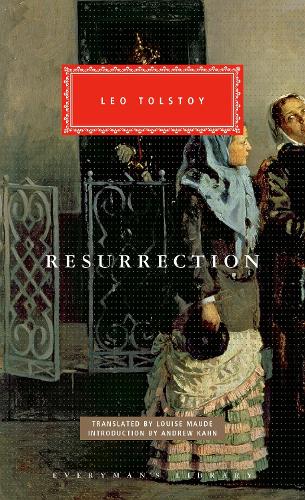
Resurrection
(Hardback)
Available Formats
Paperback
Published: 27th August 2009
Hardback
Published: 14th October 2025
Paperback, UK ed.
Published: 7th July 2014
Publishing Details
Resurrection
By (Author) Leo Tolstoy
Translated by Louise Maude
Introduction by Andrew Kahn
Everyman
Everyman's Library
14th October 2025
3rd July 2025
United Kingdom
Classifications
General
Fiction
Fiction in translation
Narrative theme: politics / economics
Narrative theme: interior life / psychological fiction
Narrative theme: sense of place
891.733
Physical Properties
Hardback
536
Width 135mm, Height 211mm, Spine 29mm
594g
Description
Tolstoy's most controversial novel is the dramatic tale of a remorseful nobleman who seeks redemption after a woman he once wronged is convicted of murder - only to discover a whole world of injustice previously unknown to him. A nobleman faces the consequences of his youthful wrongdoing when the girl he seduced and abandoned some years earlier is put on trial in a murder case. Initially conceived as a love story, Tolstoy's last novel, published in 1899, is a dark masterpiece in which the whole of Imperial Russian society is tried and found wanting. Resurrection moves from the salons and country estates of the aristocracy to courtrooms and government offices, brothels and prisons; from Moscow and St Petersburg by road, rail and route march to the penal settlements of Siberia. Its pages are peopled with convicts and gaolers, revolutionaries and religious sectaries, soldiers, labourers and lawyers, peasants, priests and prostitutes. While for Prince Nekhlyudov and Katusha Maslova salvation through love proves problematic, the journey into exile becomes one of self-discovery and spiritual transformation.
Reviews
Sweetness and light among shame and confusion. The greatest of all novels is Leo Tolstoy's final novel, Resurrection. Its effect upon a reader is immense and immediate. * Independent *
My all-time favourite is Resurrection. Its themes of social injustice and personal redemption resonated in the Seventies, when I first read it. This, I thought, is what all books should be like: serious, committed and passionate -- Howard Jacobson * Guardian *
In Resurrection the return to the land, as the physical correlative to the rebirth of the soul, is beautifully renderedThe sun glimmers on the river, the colt nuzzles, and the pastoral scene enforces on Nekhlyudov the full realization that the morality of urban life is founded on injustice The account of the eastward transportation of the prisoners is handled with a breadth of design and aliveness which transcend any programmatic purpose. When Tolstoy opened his eyes on actual scenes and events his hand moved with matchless artistry. -- George Steiner
The greatest of all novels is Leo Tolstoy's final novel, Resurrection. Its effect upon a reader is immense and immediate. Even after eight readings of various translations, I continue to feel its spell and admire its complexity This brilliant, troubling novel at first out-sold Tolstoy's earlier novels, even War and Peace. It was criticized for its outspoken contents. It remains a grand panorama of discontent -- Brian Aldiss * Independent *
Author Bio
Leo Tolstoy (Author) Leo Tolstoy was born in central Russia on 9 September 1828. In 1852 he published his first work, the autobiographical Childhood. He served in the army during the Crimean War and his Sevastopol Sketches (1855-6) are based on his experiences. His two most popular masterpieces are War and Peace (1864-69) and Anna Karenina (1875-8). He died in 1910.
